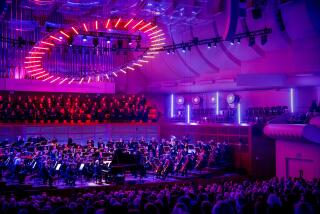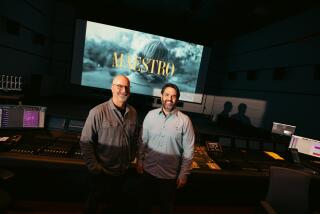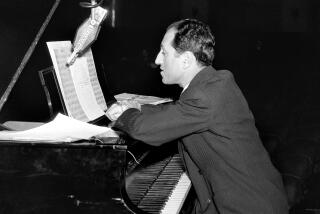Composer Max Richter wants fans to spend the night in Grand Park
When most musicians play a piece, they hope the audience will engage with the music and open their ears to the sound of the instruments. Ideally, listeners can get some sense of the shape of the work itself, whether a 12-bar blues or a five-movement symphony. The person who wrote the music, typically, is even more invested in it being heard.
But Max Richter, the composer and keyboard player for two all-night performances this weekend in Grand Park, doesn’t even care if the sold-out audience stays awake.
He’s trying to ask questions about the way music — especially more-or-less classical music, now draped in centuries of formality — is performed. “I wanted to break that open a bit,” the German-born, Britain-based composer, 52, says from his home near Oxford. “The audience arrives; they can go to bed. They have cots there. There are no rules. I hope they’ll make a journey through the night, in a way that feels authentic to them.”
The piece he’s discussing, “Sleep,” is an eight-hour minimalist work he’ll lead Friday and Saturday nights through sunrise the next mornings. “The piece is conceived as a kind of landscape,” he says, speaking in the gentle, considerate tones of a psychotherapist. “To travel through — to inhabit.”
The weekend’s gig will not only be Grand Park’s first overnight event and the first Los Angeles performance of “Sleep” — a 2015 composition that has caused a real stir in the U.K. — but the piece’s first outdoor performance anywhere in the world.
Richter’s roots are in classical minimalism, experimental composers such as Luciano Berio (with whom he studied in Italy), the ambient tradition and British dance music. He has a real conservatory education but also spent his youth building synthesizers in his bedroom and collaborating with DJ-producer Roni Size.
“One of the first records that got me excited about the possibilities of music was Brian Eno’s ‘Discreet Music’ — using the studio as a sculptural tool,” he says.
His work, appropriately, ranges from television and film scores — the science-fiction movie “Arrival,” HBO’s “The Leftovers” — to classical pieces such as his Kafka-inspired, Tilda Swinton-narrated breakthrough, “The Blue Notebooks,” or his chart-topping reimagining of Vivaldi.
Richter wrote “Sleep” in response to his own creeping sense that life in the post-industrial West was losing its focus and its possibility for repose; he even consulted with an American neuroscientist in the course of the composition. “We’re a bit data-saturated now; we live on our screens 24/7,” Richter says. “We’re on that production-consumption hamster wheel all the time.”
And the most extreme version of this, he says, is insomnia, which he sees as an epidemic. With “Sleep,” he wanted to offer “a place to rest,” as well as “a work of resistance — a quiet protest.”
With its slow, pulsing keyboards, serene strings and evocation of the ocean and the night sky, the piece takes a stand against — or comes out the other side of — a movement that defined the arts for nearly a century.
“The whole Modernist project was about intensity of experience, ever more supercharged harmony and texture and color … all these things turned up, slowly, across the 19th and 20th centuries,” Richter says. “Work in that tradition is all about providing a manifesto: ‘Here it is, understand it.’ While for me, the center of ‘Sleep’ is the individual listener’s experience, the individual listener’s journey.”
Richter’s own journey to the Los Angeles performance of “Sleep” will be very different from the trip most of the audience takes. He will be severely jet-lagged from his flight from London and will basically wake up, eat breakfast and walk onstage to perform. At about 10:30 p.m.
“For us, it’s a physical and psychological challenge,” he says of his fellow musicians, soprano Grace Davidson and the American Contemporary Music Ensemble string quintet. “It’s got a bit of an extreme-sport dimension.”
Each of the musicians, including Richter, gets a few brief breaks to rest, stretch and eat, but the piece will continue for eight uninterrupted hours. “You get stiff and you get hungry,” he says, lessons learned from performances in a handful of spots — an industrial space in London, the Sydney Opera House, and a techno club in Berlin among them.
Unlike these other sites, the L.A. show will be outdoors. Although that creates difficulties — the potential for wind, changing heat and humidity that frustrates the tuning of string instruments — Richter is looking forward to the way the light changes over time. “That’s one of the most beautiful things about it, and we can’t do it in a concert hall. And conceptually the piece has a sort of dawn written into it,” which he hopes will become quite literal when the sun rises about 6 a.m. on Saturday and Sunday mornings.
The unconventional setting was part of what interested the Music Center, which programs and operates Grand Park. Artistic consultant Jorn Weisbrodt likes the composer’s interest in “rethinking the standard concert situation.” Weisbrodt saw the eight-hour “Sleep” in New York and describes it as peaceful and introspective, “like the aftermath of yoga class, with a big exhale at the end.”
Says Weisbrodt: “I’m always interested in creating situations where audience members don’t have to understand all the codes. You don’t need any knowledge to get into this — you just need to be open. You don’t need to know why Shostakovich wrote the Third String Quartet.”
Richter’s “Sleep” is part of a larger recognition of — maybe, even, a quiet rebellion against — the importance of slowing down in an accelerated world: It sits comfortably alongside the large-scale choreography of Anne Teresa De Keersmaeker, the autobiographical novels of Karl Ove Knausgaard, Moby’s own sleep cycle (released a year after Richter’s), the reissue of “2001: A Space Odyssey” and the “longform” movement in journalism. The last few years have also seen several books on the importance of sleep itself.
“I think we are in an incredibly challenging time psychologically,” Richter says. “All the certainties and norms you felt you could rely on are being destroyed or under attack.” In Britain, he says, anxiety over the Brexit vote has the nation on edge even beyond the larger digital jitters.
“At such times, creativity does have a role,” Richter says. “Art and creativity are in some ways one-to-one communication, but also social projects. I’ve wanted the work to have an engagement with social reality.”
Sometimes, that means a lack of certainty. “We play it a little differently each time, based on what the audience is like, what the setting is like. So you never really know how it’s gonna go.”
More to Read
The biggest entertainment stories
Get our big stories about Hollywood, film, television, music, arts, culture and more right in your inbox as soon as they publish.
You may occasionally receive promotional content from the Los Angeles Times.






